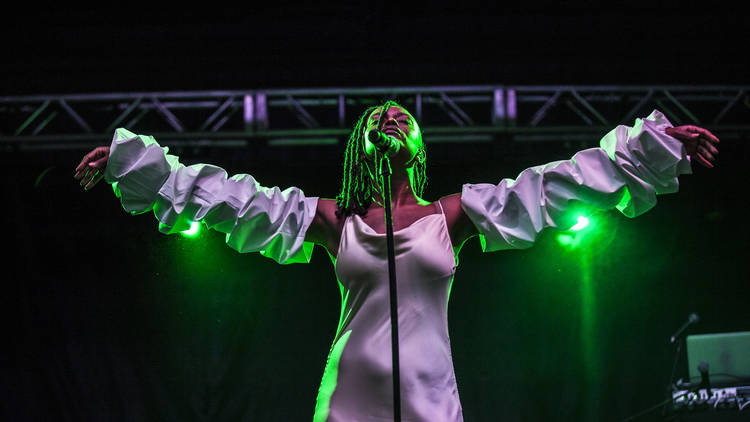2018 was the year that Pitchfork quietly became a leftfield R&B festival. It's not just that; there will always be room for plenty of indie rock at this particular shindig. But if there's a major overarching story of this year's festival, it's the story of a subtle tectonic shift. Tonight, old gods Lauryn Hill and Chaka Khan will close out the whole festival. On Friday evening, Syd brought out all the members of her band the Internet to dance along with her onstage. Tame Impala are down-the-middle festival headliners, but there's enough R&B in their DNA that they fit the trend. Even the rappers on the bill are mostly the type to find plenty of room for melody and sensitivity in what they do.
Saturday's lineup, in particular, was a parade of shimmery pleading, a primer for some of the many ways to twist soul-music history in different, exciting ways. Until the IPA-rock one-two punch of the War On Drugs and Fleet Foxes closed out the two main stages, the day played out like an oblique quiet-storm mixtape: The contemplative art-school hush of Moses Sumney, the effortless showmanship of one-man Essence Fest Raphael Saadiq, the pillowy and utopian synth-funk of the rapturously received Blood Orange. And then there was Kelela, who turned an early-evening slot on the smaller third stage into something grand and majestic.
After Kelela's set, I heard a few people comment that they'd expected her to be chilly and cerebral, a flesh-and-blood equivalent to the sleek cyborg that she sometimes portrays in her videos. It's easy to see how they'd think that; on record, Kelela has carved out her spot by singing her lush and virtuosic melodies over twitchy spartan future-club beats. But that's not her. She is an R&B singer, with all the churchy warmth and emotional connectiveness that the term implies. And with the third-stage crowd treating her like a conquering queen, she gave one of those beautiful too-rare performances where singer and audience seem to be equally in love with one another. "If I weren't brown, I'd be blushing," she told us as her set ended.
In material terms, Kelela's setup is pretty minimal -- one laptop DJ, two backing singers. But she's thought hard about every aspect of how to play a festival like this. It's a complete presentation. Everyone onstage wore blinding, billowing white. When Kelela first steps onstage, she and her singers moved together with choreographed precision, every step and hand gesture in perfect sync. She's an absolutely magnificent live singer, her delicate and intricate runs sounding, if anything, even better live. This was one of those shows where the audience roars at every big note, not just at the end of every song, and there were a lot of big notes. Historically, rock-based festivals can have trouble with different electronic-music sounds, but that wasn't an issue here; the bass was loud enough that its presence was almost physical. And Kelela remained elegant and composed even as her set hit its passionate peaks.
I've been writing about Kelela for years, and I've seen her live before, but I was not prepared for how the crowd took to her. When you write about music on the internet, as I do, there's a temptation to see a lot of it as a purely internet-based phenomenon. You wonder whether there's really an audience out there for it -- especially for the more esoteric stuff that seems like it might exist just for the cadre of dorks who read and write about it all day. But last night in Chicago, Kelela was a legit star, a towering figure. Girls congregated in the front row fervently howled along with every word she sang. When she said that she'd have to cut one song for time, people acted like it was a tragedy. She's here. She's arrived. And if she can command a crowd in person like what I saw last night, she is only going to get better as more of the world catches on.






